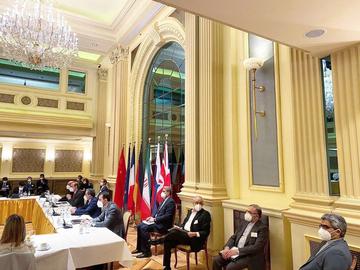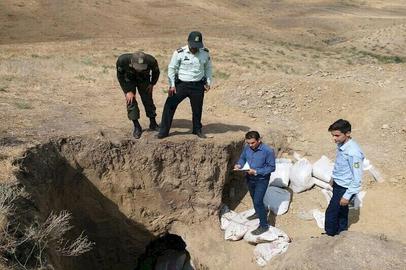For Iran, the talks in Vienna with the United States must have one key outcome: the lifting of sanctions.
For the US, the main objective is a massive scaling down and curtailing of Iran’s nuclear program — an objective it shares with the five other countries that helped broker the nuclear deal, the Joint Comprehensive Plan of Action (JCPOA), in 2015. That deal led to the lifting of sanctions in January 2016, which were then reimposed when the US, under Donald Trump, abandoned the deal in 2018.
The revival of the JCPOA has been marred by various hurdles, the accusation by Iranian foreign minister Mohammad Javad Zarif that Russia tried to disrupt the deal being one of the most recent.
Iran has made its demands clear. But if sanctions are lifted, would the situation return to what it was back in 2015? What would be different? What has changed since then and will it be possible for Iran to recalibrate its business environment and economic conditions?
**
One of Iran’s demands is for the Biden administration to lift what are termed as “secondary sanctions,” restrictions on non-US individuals and entities. But over the last few years, the relationships Iranian businesses and organizations had once fostered with its international counterparts have splintered and the systems once in place to facilitate economic cooperation no longer exist. The situation has changed profoundly.
Iranian citizens know this, and in general, they have little hope that sanctions will be lifted, or that if they are the impact will be such that it will affect their lives in any meaningful way. The pessimism is echoed in the bazaars and shops of Tehran and Isfahan, and among the leaders of big business in Iran. It is impossible to muster the enthusiasm that characterized that summer night in July following the signing of the deal.
JCPOA: No Longer a Guarantee that Sanctions Will be Lifted
The JCPOA has a proviso that if sanctions were re-imposed for any reason, contracts signed with Iran during the period when sanctions were lifted would remain valid, and reimposed sanctions would not affect these particular business arrangements. However, this clause of the JCPOA was practically unenforceable. Today, it is no longer considered a guarantee as it once was.
When Trump withdrew the United States from the JCPOA, the reimposition of sanctions was envisaged in two phases: the first would take three months and the second six months. During this period, individuals and companies that had contracts with Iran could continue to operate without restrictions.
Many European and Asian companies, including refineries in India, China and South Korea, were fundamentally opposed to the return of US secondary sanctions, and some even stated they would not recognize the reversal.
As the US took steps to reimpose sanctions on the Islamic Republic, it announced that it had granted exemptions to companies purchasing Iranian oil in a bid to prevent rising oil prices.
This was met with agreement from Iranian officials for a period, but then, contrary to all expectations, Iran's trade and oil industry quickly terminated its contracts, and all cooperation with the Islamic Republic ended prematurely out of fear of US sanctions and the fines and penalties that could ensue for companies working with Iran.
Large Costs on Small Contracts
Given that the previous period when sanctions were lifted remained valid for a mere 17 months and that the part of the JCPOA that had exempted contracts from sanctions was never implemented, companies and countries that had partnered with the Islamic Republic suffered financial and credit losses when their contracts were suspended. The loss was heavier for smaller companies and their smaller contracts.
If sanctions are lifted again, companies will carry out fresh risk assessments for their possible return to the Iranian economic environment, and a great deal of these assessments will take into account what the companies went through in the past. This will mean more vulnerable companies will refuse to partner with Iran, or they will map out new stipulations in their contracts that will likely be detrimental or damaging for Iran. These companies will be sure to cover their potential losses In the event that sanctions are reimposed once again.
Higher Costs for Iran
Large institutions and major international investors will typically be more conservative when assessing the risk of returning to Iran and cooperating with the Islamic Republic than they were under the previous process of sanctions being lifted. These contracts will undoubtedly cost Iranian businesses more this time around. One cost that will definitely increase will be insurance rates applied to contracts companies enter into with the Islamic Republic and its industries.
Assuming sanctions are lifted again, companies planning to work with Iran will factor in the possibility of sanctions being reimposed on their contractors and will anticipate the costs they will incur, including arbitration in the event of a dispute arising from the sanctions. Again, this will make the cost of cooperation more expensive for both parties.
To understand the current situation in the Islamic Republic, a relatively comparable situation is instructive. Consider a driver who rents a car. If this driver has an accident every time he rents out a car and therefore has an impact on the rental company, the next time he rents a car, his insurance rate will increase because of his previous record and because he is considered a high-risk individual. Rental rates will also be increased for that particular customer.
Money Laundering, Terrorism and Transparency
When sanctions were lifted in 2016, the Islamic Republic had an incentive to join the provisions of the Financial Action Task Force (FATF) and was removed from its blacklist after taking preliminary measures. Today, it is on the blacklist again. In fact, it is ranked as one of the worst money laundering environments in the world.
The FATF’s remit is to combat money laundering and the financing of terrorism, and Iran’s relationship with the task force has led to deep divisions within Iran’s ruling elite.
Iranian officials who oppose joining the FATF say its terms are in direct conflict with the Islamic Republic's policies, particularly with regard to aid to militant groups in the region. In other words, a faction of the power structure in Iran officially supports a policy of circumventing money-laundering regulations and emphasizes the need for financial transactions to remain "non-transparent."
This approach is important for international companies when they decide whether they are willing to engage with the business and investment environment in Iran. Due to the deteriorating situation in Iran regarding financial transparency and efforts to combat money laundering, the risk companies take when doing business with Iran has clearly increased. Therefore the motivation to take actions resembling the ones taken in the past is likely to have decreased significantly. Since Iran is now ranked as a country where money laundering is rife, any company that decides to do business with Iran and use its banking and financial systems runs a significant risk of involuntary involvement in money laundering and related crimes.
Investments that were initiated during the short period when sanctions were lifted took place in a very different environment. Iran’s economic health was stronger, among other factors. And even in that brighter, more fertile environment, it is not as if investors flocked; many of them expressed great hesitation, and in some cases, cooperation memorandums never progressed to contracts.
Even if small companies decide to return to the Iranian market and accept the risk of cooperating with Iran, large international companies commanding larger contracts will be very limited. And yet it is these big companies that will determine how Iran’s post-sanctions economy will take shape.
The return to a relatively “normal” economic climate can only happen if Iran commits to anti-money laundering regulations, and even then, such a change will not be immediate. Given the political divisions in the US, there is also no guarantee that agendas championed by Donald Trump will not be reignited again.
The United States’ withdrawal from the JCPOA and the return of unprecedented sanctions against the Islamic Republic has been a major blow to the confidence of investors and international organizations who worked or wanted to work with and in Iran. The effects of this will reverberate for years.
Accordingly, if US sanctions are lifted again, the return of major investors, including in the much-needed oil and gas industry, is unlikely.
What the Islamic Republic is likely to witness is small-scale commercial contracts, mainly regarding the sale of consumer goods. These contracts will come at a cost much greater than that of five years ago.
When the US withdrew from the JCPOA, Iran lost a historic opportunity, which was initiated to a great degree by the administration of Barack Obama. Although Donald Trump walked away from the deal, there can be no question that Iran provoked this collapse. Whatever happens now, even the best case scenario will mean Iran will only begin an early process of regaining some of this opportunity. The Iranian citizens are the big losers here, and this loss will be felt, without compensation, for years to come.
Related coverage:
Iran Sets Out Conditions for the Revival of the Nuclear Deal (At Least on Paper)
Uncertain Future for Nuclear Deal as Rouhani’s Presidency Comes to an End
visit the accountability section
In this section of Iran Wire, you can contact the officials and launch your campaign for various problems


























comments